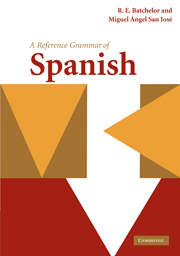Book contents
- Frontmatter
- Contents
- Preface/Prólogo
- Acknowledgments/Agradecimientos
- Abbreviations/Abreviaturas
- Introduction to the Spanish language/Introducción a la lengua española
- Part I
- Part II
- Part III
- Part IV
- Part V
- Part VI
- Part VII
- Part VIII
- Part IX
- Part X
- Appendix I Verb tables/ Tablas de verbos
- Appendix II Glossary/Glosario
- Bibliography/Bibliografía
- General index/Índice general
- Subjunctive index/Índice del subjuntivo
Introduction to the Spanish language/Introducción a la lengua española
Published online by Cambridge University Press: 05 June 2012
- Frontmatter
- Contents
- Preface/Prólogo
- Acknowledgments/Agradecimientos
- Abbreviations/Abreviaturas
- Introduction to the Spanish language/Introducción a la lengua española
- Part I
- Part II
- Part III
- Part IV
- Part V
- Part VI
- Part VII
- Part VIII
- Part IX
- Part X
- Appendix I Verb tables/ Tablas de verbos
- Appendix II Glossary/Glosario
- Bibliography/Bibliografía
- General index/Índice general
- Subjunctive index/Índice del subjuntivo
Summary
After English, Spanish is the most widely spoken language in the world. Recent calculations suggest that at least 400 million people use it as their mother tongue. Its study is therefore most worthy of our attention. As with English, it is characterized by a striking energy and inventiveness, and a high capacity for survival; for all its diffuseness, it exhibits a remarkable integrity, notably in its grammatical coherence. The Spanish language arose from the dissemination of Vulgar Latin, a spoken form of various dialects of the classical Latin of a Caesar, a Virgil or an Ovid, to be transformed into the most dynamic of the Romance languages, superseding even French. Alongside Dante's Commedia dell'Arte, Camões' The Lusiads, Rabelais' Gargantua, and the writings of the Romanian Alecsandric, the vigor and imagination of the Spanish vernacular were expressed in Cervantes' Don Quijote, which some feel created a paradigm for the language. Indeed, many Spanish-speakers, not just from Spain, refer to Spanish as “la lengua de Cervantes.”
The first recognizable piece of writing in Spanish appeared in the year 800 under the title Los Cartularios de Valpuesta. Furthermore, this fragment of Spanish is the first of any kind in a Romance language and predates the Serment de Strasbourg, written in Old French in the year 842.
- Type
- Chapter
- Information
- A Reference Grammar of Spanish , pp. xv - xviiiPublisher: Cambridge University PressPrint publication year: 2010

